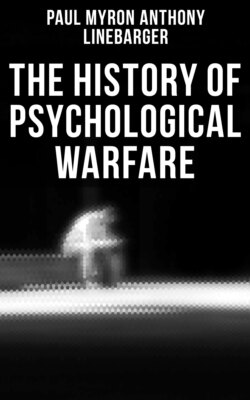Читать книгу The History of Psychological Warfare - Paul Myron Anthony Linebarger - Страница 8
На сайте Литреса книга снята с продажи.
The Use Of Panic By Gideon.
ОглавлениеOne of the earliest (by traditional reckoning, 1245 B.C.) applications was Gideon's use of the lamps and pitchers in the great battle against the Midianites.
The story is told in the seventh chapter of the Book of Judges. Gideon was in a tactically poor position. The Midianites outnumbered him and were on the verge of smiting him very thoroughly. Ordinary combat methods could not solve the situation, so Gideon—acting upon more exalted inspiration than is usually vouchsafed modern commanders—took the technology and military formality of his time into account.
Retaining three hundred selected men, he sought for some device which would cause real confusion in the enemy host. He knew well that the tactics of his time called for every century of men to have one light-carrier and one torch-bearer for the group. By equipping three hundred men with a torch and a trumpet each, he could create the effect of thirty thousand. Since the lights could not be turned on and off with switches, like ours, the pitchers concealed them, thus achieving the effect of suddenness.
Figure 2: Nazi Troop Morale Leaflet. In this leaflet, used on the Italian front in 1944, the Nazis did not call for any specific action from their American GI readers. Their aim was merely depression of American morale for future exploitation by action propaganda. Note the extreme simplicity of the message. Throughout World War II, the Nazis were misled by their own tendentious political intelligence reports and consequently overestimated the kind and degree of American opposition to Franklin D. Roosevelt. They mistook normal complaint for treasonable sedition; hence, leaflets such as this seemed practical to the Germans.
Figure 3: One of the Outstanding Leaflets of the War. Prepared in 1945 for distribution by B-29s operating over Japan, this leaflet lists eleven Japanese cities which were marked for destruction. The leaflet is apparently of the civilian-action type, calling on Japanese civilians to save their own lives. At the same time, it had the effect of shutting down eleven strategically important cities, thus hurting the Japanese war effort while giving the Americans a reputation for humanity and also refuting enemy charges that we undertook indiscriminate bombing.
Figure 4: The Pass Which Brought them in. Germans liked things done in an official and formal manner, even in the midst of chaos, catastrophe and defeat. The Allies obliged, and gave the Germans various forms of very official-looking "surrender passes," of which this is one. The original is printed in red and has banknote-type engraving which makes it resemble a soap-premium coupon. (Western Front, 1944–45, issued by SHAEF.)
He had his three hundred men equipped with lamps and pitchers. The lamps were concealed in the pitchers, each man carrying one, along with a trumpet. He lined his forces in appropriate disposition around the enemy camp at night and had them—himself setting the example—break the pitchers all at the same time, while blowing like mad on the trumpets.
The Midianites were startled out of their sleep and their wits. They fought one another throughout their own camp. The Hebrew chronicler modestly gives credit for this to the Lord. Then the Midianites gave up altogether and fled. And the men of Israel pursued after the Midianites.2 That settled the Midianite problem for a while; later Gideon finished Midian altogether.
This type of psychological warfare device—the use of unfamiliar instruments to excite panic—is common in the history of all ancient countries. In China, the Emperor-usurper Wang Mang on one occasion tried to destroy the Hunnish tribes with an army that included heavy detachments of military sorcerers, even though the Han Military Emperor had found orthodox methods the most reliable; Wang Mang got whipped at this. But he was an incurable innovator and in 23 A.D., while trying to put down some highly successful rebels, he collected all the animals out of the Imperial menagerie and sent them along to scare the enemy: tigers, rhinoceri, and elephants were included. The rebels hit first, killing the Imperial General Wang Sun, and in the excitement the animals got loose in the Imperial army where they panicked the men. A hurricane which happened to be raging at the same time enhanced the excitement. Not only were the Imperial troops defeated, but the military propaganda of the rebels was so jubilant in tone and so successful in effect that the standard propaganda theme, "Depress and unnerve the enemy commander," was fulfilled almost to excess on Wang Mang. Here is what happened to him after he noted the progress of the enemy: "A profound melancholy fell upon the Emperor. It undermined his health. He drank to excess, ate nothing but oysters, and let everything happen by chance. Unable to stretch out, he slept sitting up on a bench."3 Wang Mang was killed in the same year, and China remained without another economic new deal until the time of Wang An-shih (A.D. 1021–1086), a thousand years later. Better psychological warfare would have changed history.
